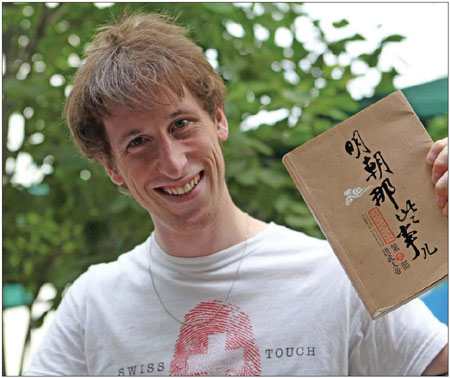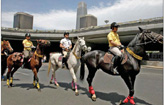People
Way of a warrior
Updated: 2011-06-10 10:27
By Zhang Xi (China Daily European Weekly)

Swiss expat Liam Bates hosts a travel show on Chinese television. He says the landscapes of Tibet remind him of his homeland. Wang Jing / China Daily
YOUNG GUN 1: A passion for kungfu launched a new life in television and in the middle kingdom
When Liam Bates was 16-year-old he started learning martial arts in his Swiss homeland but wasn't happy with his teacher so he begged his father to send him to the home of kungfu.
Later that year during his summer vacation, the then high-school student flew to the Capital Institute of Physical Education in Beijing to realize his dream.
Bates caught the China bug, and seven years later has settled into the Middle Kingdom. The 23-year-old even has his own TV program.
When talking about his China adventures, his clothing says a lot about his fusion of cultures. Bates wears a white T-shirt bearing the words "Swiss Touch" and is holding a copy of a Chinese book named Those Stories about Ming Dynasty.
"Before I came to China, I knew about the country from TV and also my parents' descriptions," he says, speaking almost perfect Chinese.
"They often talk about their three-month cycling travel from Hong Kong to Beijing in 1985. Those old stories raised my interest in China."
His father, an economics teacher, told young Bates that China was developing fast and he should go there to see by himself.
From 2004 to 2006 he came to China for every summer holiday to learn kungfu, the Chinese language and as much culture he could lap up.
In 2007, he started college life at University of British Columbia in Canada and double majored in film production and Chinese.
He participated in Chinese Bridge, an annual Chinese proficiency competition for foreign college students, organized by the Confucius Institute Headquarters and last year won a top prize, which included a scholarship at a Chinese university.
Bates took refresher courses at the Communication University of China in Beijing, and learnt cross-talk with Ding Guangquan, a well-known Chinese cross-talk performer famous for training foreign students.
Bates is also a part-time TV program host on China's Travel Channel, and gets the chance to experience the lives of normal people in very remote areas. He sometimes needs to spend more than 20 hours on the road to reach his destination.
"The host job offers me opportunities to see far-away places. Inner Mongolia, Qinghai and the western Sichuan province are my favorites," he says.
"Life in a metropolitan city is good, too, but after some months, I have to relax myself in a sparsely populated area," adds Bates, who was born and raised in a small village near Geneva.
He says the geography and architecture in the Swiss mountain areas are similar with those in Tibet.
"When my Swiss friends arrived in Tibet, they were surprised by the similarities," says Bates.
In his eyes, Switzerland is a blend of old and modern. There are many farmers in the countryside who have simple and traditional lives, while city residents' rush along at a fast and hectic pace.
"I do not know Swiss expats in China, except diplomats," says Bates. "That may be because of my country's small land area and population.
"That is how I describe my country and people to Chinese."
And how does he talk about China to his Swiss countrymen and women?
"The word I use the most is 'exciting' since the country is changing so quickly," he says.
"Life in my hometown may not have changed for years, but here, life is different every day."
The most memorable part of his life in China so far was when he was involved in a serious road accident.
In 2009, his group rode motorcycles from Tibet to Shanghai to film a documentary about the dreams and aspirations of young people they met during their journey.
His left leg was broken when they were near their destination, and Bates was sent to an advanced hospital in Shanghai.
However, what was most memorable about that trip was not the accident, but the happiness gained from helping a Tibetan teenager see the outside world.
"That 19-year-old boy is the brother of my friend and he has never stepped out of his hometown. We took him to travel with us to realize his dream. That was my most memorable experience in China.
"Our documentary, Ten Thousand Miles finally participated in some foreign film festivals."
Apart from travel and film production, Bates is interested in rock climbing, Latin dance and eating spicy Chinese food. "Besides these activities, I study Chinese textbooks and practice cross-talk every day to keep my Chinese fluency," he says.
"For me, textbooks are not the only resource of Chinese learning. That is what I knew when I first arrived in China. My classmates could not communicate with Chinese smoothly because they only attended classes.
"They might recognize more characters than me, but their oral Chinese is much worse than mine."
He considers bargaining an ideal way to practice numbers in Chinese.
"I pretended not be able to speak English, so that those stallholders who spoke a little English could only communicate with my in Chinese," Bates says. "In this way, I can react very quickly to numbers in Chinese."
Another good way to learn Chinese characters is to take a bus to an unknown place and try to come back, he says.
"I used to take a bus randomly, get off at the terminus and then tried to find where I was," he says.
"I tried to match Chinese characters on the stop board with those on the map. If I did not recognize them, I would ask passer-by. Therefore, I knew many new characters."
But unlike many expats, Bates does not consider Chinese tones the most difficult part to learn. Stress and rhythm are his major hurdles.
Bates continually tries to improve his Chinese, so he talks with his teachers about a variety of subjects to broaden his vocabulary. "I want to do business between China and Switzerland, so I have to master the language," he says.
Bates' role model is Dashan (the Chinese stage name adopted by Canadian Mark Henry Rowswell, the most famous Western personality in China's media industry).
But he still feels he needs another five years of toiling at the language.
"Who knows what will happen years later?" he says. "Maybe because of my mother's influence, I like to focus on the status quo and do not make too many plans for my future."
Perhaps for young Bates, the line of the Oscar winning movie Forrest Gump is his best motto, "Life is like a box of chocolate. You never know what you're gonna get."
E-paper

Pearl on the Yangtze
Wuxi is considered a town of natural beauty and its motto is "city of water and warmth".
Prose and consternation
Riding on a mystery train
Way of a warrior
Specials

Wealth of difference
Rich coastal areas offer contrasting ways of dealing with country's development

Seal of approval
The dying tradition of seal engraving has now become a UNIVERSITY major

Making perfect horse sense
Riding horses to work may be the clean, green answer to frustrated car owners in traffic-trapped cities
